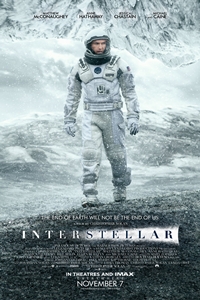
Interstellar
Cooper (Matthew McConaughey) is a former astronaut turned farmer, living with his father-in-law (John Lithgow) and his own children, Murph and Tom (played as adults by Jessica Chastain and Casey Affleck, respectively). Cooper was never able to break the stratosphere while flying his craft, and now he grows corn since wheat is no longer an option. The world is rationed poorly and must sustain itself in any way possible, but a conversation with Murph's principal about his children's future provides the audience with all of the world-building needed. This is a futuristic Earth that doesn't have flying cars or advanced technology or anything we usually see in dystopias; instead, we have a world that views those as evils that burn through resources and don't benefit the masses. It's a depressing landscape considering the meals eaten (all corn based) and the constant threat of life faced by huge, town-encompassing dust storms that slowly sneak over the horizon. Everything changes, though, when Coop discovers a strong gravitational pull in his house that leads him on a wild goose chase to coordinates that expose the inner workings of space exploration.
Cooper's reconciliation with his old Professor Brand (Michael Caine) and his teaming with astronauts Amelia (Brand's daughter, played by Anne Hathaway), Doyle (Wes Bentley), and Romilly (David Gyasi) lead him on a journey to a wormhole near the dark part of Saturn. Here, they might reach the possibilities of space travel and discover inhabitable planets with sustainable resources to create new life. Ultimately, though, the journey revolves around Cooper's resilience to rekindle his relationship with his daughter, who hated him for leaving, along with his balance of saving the human race or missing the opportunity to ever return home. These are bold, empowered ideas that Nolan tackles viciously alongside his screenwriting brother, Jonathan. Conversations surround relativity, anti-gravity, wormholes, our linear view of time, and other lofty, over-our-head concepts that most viewers will not understand in the slightest. I'm sure the film's naysayers will arise out of their inability to understand its heady ideas (a rightful belief) or the "glaring loopholes" that arise out of its own world-building and the inexplicable nature of its groundings of theoretical notions. Yet that makes the film such a visionary achievement: it has this distinct vision of a future where humanity condemns the wastefulness of space travel while also needing it to survive, leading to discoveries never conceived before.
As an epic, the film rightfully grounds its story in a warm center that I believed wholeheartedly: the feeling of being human. Love, fear, nostalgia, regret; most of the emotions that arise in the film are melancholic and wistful. One of the planets that the astronauts discover has time pass as 7 years for every hour spent there in human time. If they head there, their journey is changed forever. There's a scene that floored me emotionally and left me in tears when I can usually stay strong during films, and it happened only an hour in. Once that hit, my investment in the film was undeniable and its power unmatched. McConaughey's performance is underappreciated with how dynamic it is as a catalyst for the film's central emotion, and it's one of his finest in this career self-resurgence. Hathaway's performance is strong and grounded, too, particularly as her and Chastain emerge above the typically female-light Nolan roles and become powerful, versatile characters that make human mistakes and also have a stake in the long-term actions of the film's discoveries. It becomes grating, then, when Hathaway's Amelia has a scene in which her emotions overrule her clear intelligence and she's scapegoated for it, despite the fact that Cooper does the exact same thing in regards to saving his family. It hinders an otherwise powerful dynamic between the two characters. There's also a heartwrenching scene with Gyasi's Romilly that provides nuance and understatement within the epicness of the film.
That might be the most defining element of Interstellar: its ability to showcase the smallness of human emotion within the epic, endless frame of deep space. What better way to showcase that grandness than in IMAX, as Nolan once again returns to the form with a new cinematographer, Hoyte Van Hoytema (after his long-time collaborator Wally Pfister left for his directorial debut), and provides roughly forty minutes worth of footage in the gorgeous format. The film's jump between the two aspect ratios has the larger scope scenes envelop the audience and hold a grip on our field of vision in a way that's unrivaled. The score, in particular, reemphasizes that notion of being grasped by the film, with Hans Zimmer's beautifully old-fashioned and manipulative music guiding the audience down the rabbit hole. I'm more accepting of Nolan's methods than many critics, which arguably attests to my subjectivity in praising the film. It's an effort unlike any other I've seen on this big of a scale: an $160 million independent vision with the big budget necessary to draw in a worldwide audience. Nolan is one of the few working directors that has not made a bad film in his 20-year filmography, a testament to his distinct and sweeping visions. He does it again with Interstellar, the most gorgeously rendered science fiction epic in modern memory and one of the grandest, strongest visions of 2014.









